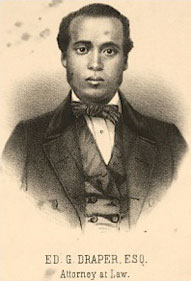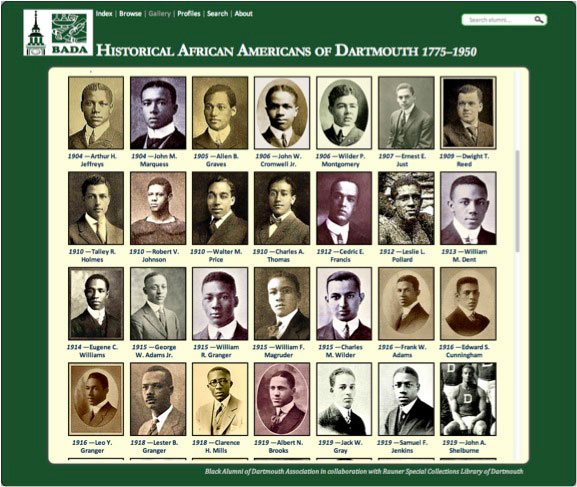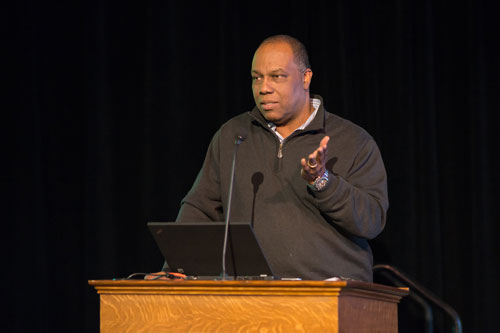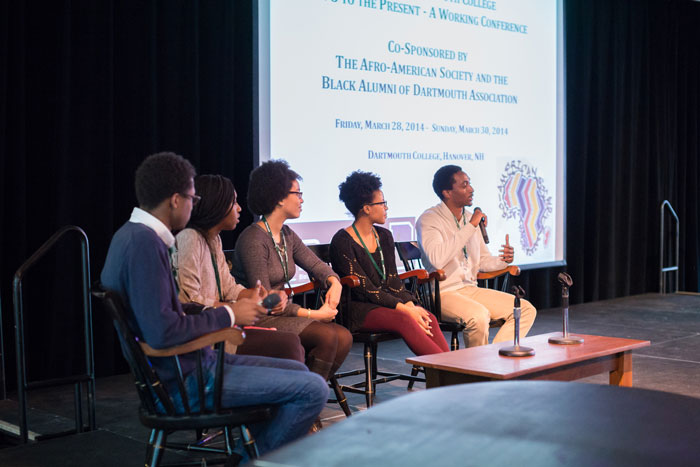“Since the matriculation of Edward Mitchell, Class of 1828, exactly 107 race students have attended Dartmouth College here in the mountains of New Hampshire. This number is far more than have attended any of the other New England colleges with the exception of Harvard.” –Pittsburgh Courier, October 2, 1943

African-American students have been studying and thriving at Dartmouth since the foundational days of the institution. This sentiment was shared by Forrester “Woody” Lee ’68 in his presentation, “History of African Americans at Dartmouth College 1775–1950,” during a “Blacks @ Dartmouth” conference held on campus from March 28–30. In just 45 minutes, Lee altered the way some members of the Black Alumni of Dartmouth Association (BADA) and the Afro-American Society (AAm) saw the early history of African-Americans at Dartmouth.
A professor of medicine at Yale, Lee has been researching this topic in his free time for the past year. He’s visited Rauner Special Collections Library and used Yale and Dartmouth online resources. Lee found that more than 130 African-American students—a number much higher than originally known to BADA—had studied at Dartmouth prior to 1950, beginning with the matriculation of Edward Mitchell, Class of 1828.

Prior to the Civil War, “Dartmouth was recognized in the African-American community as a place where a man of color could go to get educated,” says Lee. “Some of these students were rejected by other institutions. It’s a fascinating story and one we should be very proud of.” Some of the early graduates of Dartmouth and of Dartmouth Medical School went on to be the first college-educated doctors and lawyers in Liberia, surgeons in the Civil War, a clergyman in Philadelphia, and a civic leader and active abolitionist in Boston.
In admitting Mitchell in 1824, Lee noted that Dartmouth was the forerunner of other Ivy League schools, as the next college to admit an African-American student was Harvard in 1870. In petitioning the Dartmouth trustees to accept Mitchell, the students wrote, “From what we know of Mr. Mitchell’s moral character and intellectual attainment we wish him every success; so, far from feeling any disrespect towards him on account of his color or extraction, we think him entitled to the highest praise.”

Ellis Rowe ’74, president of BADA, was among the more than 70 people to attend the conference, and to listen to Lee’s presentation. Rowe noted that many alumni were familiar with the history of black alumni at Dartmouth from about 1960 onward, but they were unaware of the depth and richness of their involvement in the College’s history from virtually the founding date of the College in the 18th century.
Rowe says, “Woody showed us that Dartmouth was early in bringing black students to campus—earlier than many of the other Ivies, and earlier than we knew about. In many ways we were building upon the history of what students and alumni have accomplished before us. It suggested that, even though there continues to be a push for more equity—it showed that black students have been devoted to making the Dartmouth experience one loved and valued as a special time in their past, present, and future. This realization was the real highlight of the weekend.”

Chloe Jones ’16, a geography major and communications executive for the student group AAm, was so moved by the presentation that she is hoping to work with academic departments, libraries, and interested students and faculty to help share the story. She said, “Woody Lee said something very interesting—he said had we known what our history was it would have propelled us even further. It really gave us hope for moving ahead on our own paths and projects, whether through AAm or BADA.”
Others attending Lee’s presentation were president of AAm Jalil Bishop ’14 and the entire AAm executive committee; Richard Joseph ’65, Dartmouth’s first African-American Rhodes Scholar and now a professor at Northwestern University; and Dartmouth trustees Annette Gordon-Reed ’81, a professor at Harvard and a Pulitzer-Prize winning author, and Ben Wilson ’73, an environmental lawyer in Washington, D.C.
Since giving the presentation, Lee has had some time to consider its significance. He says, “When you come to Dartmouth, you feel you’re part of a family. But then you leave the institution and rejoin your own family, and you kind of lose your Dartmouth identity. But then to have someone say you were not the first here—which is what I felt—you’re one of a long line of students who came in small numbers, made their mark at Dartmouth, and made it very successfully. To feel that connected to your institution and to people who look like you and who have dreams and aspirations like you do, I think was magical, certainly for me.”

